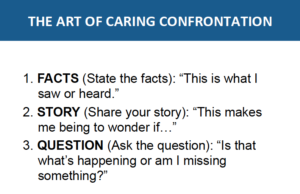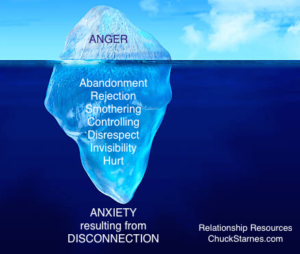For years, Mary pleaded with Jim to work on their marriage, but Jim felt they didn’t need help.
Eventually she gave up and made plans to leave him. Now Jim is desperate for help.
Mary’s desire to leave was a painful surprise and a powerful wake up call.
Having Jim’s full attention, I recommended 9 things we can do to save our marriage.
1. Express your appreciation for your partner multiple times every day
Jim’s first assignment was to share appreciations with Mary every day. This was a real change from his behavior in the past.
One evening, instead of leaving her to do the dishes, he dove in to help and said, ‘One thing I appreciate about you is how hard you work doing more than your share of the housework.’
Mary not only warmed up to the words of appreciation, she was impacted positively by Jim’s sincere desire to help with a task he usually left to her.
Good job Jim! But don’t expect immediate results. You’re goal is to win the superbowl. You just got a first down. This requires patient endurance. But that’s a good start!
2. Do things that make your partner feel loved multiple times every day
If she’s open to it, use the Caring Behaviors exercise to discover the things that make her feel loved.
If not, watch for hints that she drops. If she says, ‘If only I had a break from the kids on Saturday, I could get a pedicure’, what do you do?
That’s right! Secretly make an appointment for her, and plan a Saturday outing with the kids. Then let her know on Friday night.
When you hit the target of what makes your partner feel loved, she cannot help but feel loved. Doing this consistently will start to open your partner’s heart and rekindle her love for you.
But, if she is not open to your doing these things at first, don’t push it. Just continue making gentle efforts without pressuring her.
3. Take your partner on a date to do something fun
Not what you think is fun. Find out what is fun for her and do that.
Take her to see that movie she wants to see. Plan a dinner at her favorite restaurant. Take her to that park she has wanted to visit. Take her shopping. Find ways to laugh together.
Go all out. Pretend you’re trying to win her for the first time. Spare no effort or expense. Invest everything you’ve got. It’ll be well worth it in the end.
4. Surprise your partner with something she loves
Surprise her with coffee in the morning. Surprise her with breakfast in bed. Go out and initiate a project she’s wanting to do in the patio. Jump in and help her get the kids ready. Vacuum the house. Do the dishes. Surprise her with that new fountain she’s been wanting. Repair that broken fence that has been causing her stress. Take her out for coffee just to talk. Surprise her with flowers or her favorite candy.
Some things like planning a romantic getaway may not work if she’s not ready for that. Make sure you respect her limits at this time. Pressuring her will be counterproductive. Don’t focus on what you can’t do. Do the little things you can do.
Be spontaneous and sincere. Let your efforts to surprise her come out of a heart that says ‘I genuinely care about you’, not ‘I’m just trying to get you back.’
5. Casually initiate non-sexual touching
Don’t let it be obvious what you are doing. Be subtle about it.
A brief shoulder rub. A hug when you see her. Casually put your arm around her. Hold her hand briefly when you’re walking. A longer backrub if that is welcome. Rub her feet (even if she can’t stand you right now, she might let you rub her feet).
Give her any kind of non-sexual touch that is welcome.
Make sure to keep the touching non-sexual if your partner doesn’t want to be intimate. Give her room to not want to have sex right now if that’s where she is. You want to win her heart. When she gives you her heart, her body will follow.
Here’s a little secret: Non-sexual touching will bypass her rational rejection of you and release a chemical called oxytocin into her system which will cause her to feel closer to you and safer with you. This combined with all these other efforts you’re doing will go a long way in changing body chemistry and opening her heart to you.
6. Listen to your partner with undivided attention
Listen to what she’s thinking and feeling. Don’t judge. Don’t fix. Don’t even piggy back with your own ideas. Don’t look at your phone when she’s talking.
Use basic mirroring skills to show genuine interest and curiosity.
Use these sentence stems to simply mirror back to her what she’s saying.
‘Let me see if I got what you’re saying. You said…’
(Paraphrase or repeat word for word what she said.)
‘Did I get it?’
(This is checking for accuracy. Staying interested.)
‘Is there more about that?’
(Turning on your curiosity. And staying curious.)
Mirroring makes your partner feel like you care. Mirroring says ‘You matter. What you have to say matters.’ Your partner will translate that as ‘You value me.’
When we feel heard, we feel valued and safe. Mirroring can help your partner start to feel safe enough to join the conversation with you about your relationship.
7. Validate your partner’s reasons for not wanting to be with you
You can validate her without agreeing with her. You don’t have to admit guilt if you’re not guilty. But do not defend yourself even if she doesn’t have her story right about you.
Simply let her know that she makes sense.
Use this prompt:
What you said makes sense. And what makes sense about it is…
Here’s an example.
‘It makes sense that after years of feeling neglected and taken for granted you wouldn’t want to be with me. That makes sense.’
Let her know she’s not crazy. Anyone would feel that way.
8. Empathize with your partner’s feelings of anger, fear, sadness or hopelessness
This is where you start feeling what she feels.
Use the stem: ‘I can imagine you’re feeling’¦’
Here’s an example: ‘I can imagine how lonely you’ve felt for all these years. I can understand how empty and sad and frustrating that must have been.’
If she questions your sincerity it’s because she doesn’t trust you yet. That is normal! Just keep working to make your conversations sincere and safe for her. You’ll get there!
Finally…
9. Learn to express your own needs in the relationship
Hey Chuck, ‘What about my needs? Will there ever be a time to share my frustrations with her? This sounds like I’m taking all the blame. What about her part in the relationship failure?’
Even though you’re taking the full burden of restoring the relationship by using these tools, it will also be important eventually for you to share your own needs, desires, and frustrations.
One of the ways we can lose connection with our partner is when we withdraw and repress our own needs. We may think we’re being nice, but we are actually robbing our relationship by doing this.
In our example, part of Mary’s frustration is that, for most of their relationship, Jim didn’t share his needs. This caused her to feel abandoned by him. Ultimately Mary won’t be happy in the relationship unless she is meeting Jim’s needs, even as he is working to meet hers.
So, it will be important for your partner to listen to you in the same way, and to express love to you in the same way. She needs that as much as you do.
But for now put this idea off in the future. Wait until she feels safe and wants to be with you again.
Patience and perseverence!
At one point Jim said, “I’ve been doing these things for three weeks and she still wants to separate. It’s not working!”
I said, “How long did it take you to get in this mess? Don’t expect results so soon.”
Although…you’ll be surprised how often a breakthrough is right around the corner.
So don’t give up. Keep going!







